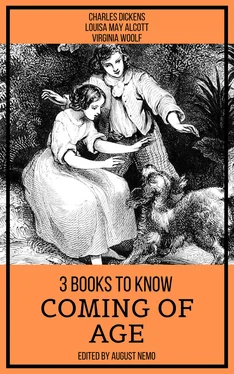"Boy of the neighbourhood? Hey?" said he.
"Yes, sir," said I.
"How do you come here?"
"Miss Havisham sent for me, sir," I explained.
"Well! Behave yourself. I have a pretty large experience of boys, and you're a bad set of fellows. Now mind!" said he, biting the side of his great forefinger as he frowned at me, "you behave yourself!"
With those words, he released me—which I was glad of, for his hand smelt of scented soap—and went his way down-stairs. I wondered whether he could be a doctor; but no, I thought; he couldn't be a doctor, or he would have a quieter and more persuasive manner. There was not much time to consider the subject, for we were soon in Miss Havisham's room, where she and everything else were just as I had left them. Estella left me standing near the door, and I stood there until Miss Havisham cast her eyes upon me from the dressing-table.
"So!" she said, without being startled or surprised; "the days have worn away, have they?"
"Yes, ma'am. To-day is—"
"There, there, there!" with the impatient movement of her fingers. "I don't want to know. Are you ready to play?"
I was obliged to answer in some confusion, "I don't think I am, ma'am."
"Not at cards again?" she demanded, with a searching look.
"Yes, ma'am; I could do that, if I was wanted."
"Since this house strikes you old and grave, boy," said Miss Havisham, impatiently, "and you are unwilling to play, are you willing to work?"
I could answer this inquiry with a better heart than I had been able to find for the other question, and I said I was quite willing.
"Then go into that opposite room," said she, pointing at the door behind me with her withered hand, "and wait there till I come."
I crossed the staircase landing, and entered the room she indicated. From that room, too, the daylight was completely excluded, and it had an airless smell that was oppressive. A fire had been lately kindled in the damp old-fashioned grate, and it was more disposed to go out than to burn up, and the reluctant smoke which hung in the room seemed colder than the clearer air—like our own marsh mist. Certain wintry branches of candles on the high chimneypiece faintly lighted the chamber: or, it would be more expressive to say, faintly troubled its darkness. It was spacious, and I dare say had once been handsome, but every discernible thing in it was covered with dust and mould, and dropping to pieces. The most prominent object was a long table with a tablecloth spread on it, as if a feast had been in preparation when the house and the clocks all stopped together. An épergne or centrepiece of some kind was in the middle of this cloth; it was so heavily overhung with cobwebs that its form was quite undistinguishable; and, as I looked along the yellow expanse out of which I remember its seeming to grow, like a black fungus, I saw speckled-legged spiders with blotchy bodies running home to it, and running out from it, as if some circumstances of the greatest public importance had just transpired in the spider community.
I heard the mice too, rattling behind the panels, as if the same occurrence were important to their interests. But, the blackbeetles took no notice of the agitation, and groped about the hearth in a ponderous elderly way, as if they were short-sighted and hard of hearing, and not on terms with one another.
These crawling things had fascinated my attention and I was watching them from a distance, when Miss Havisham laid a hand upon my shoulder. In her other hand she had a crutch-headed stick on which she leaned, and she looked like the Witch of the place.
"This," said she, pointing to the long table with her stick, "is where I will be laid when I am dead. They shall come and look at me here."
With some vague misgiving that she might get upon the table then and there and die at once, the complete realization of the ghastly waxwork at the Fair, I shrank under her touch.
"What do you think that is?" she asked me, again pointing with her stick; "that, where those cobwebs are?"
"I can't guess what it is, ma'am."
"It's a great cake. A bride-cake. Mine!"
She looked all round the room in a glaring manner, and then said, leaning on me while her hand twitched my shoulder, "Come, come, come! Walk me, walk me!"
I made out from this, that the work I had to do, was to walk Miss Havisham round and round the room. Accordingly, I started at once, and she leaned upon my shoulder, and we went away at a pace that might have been an imitation (founded on my first impulse under that roof) of Mr. Pumblechook's chaise-cart.
She was not physically strong, and after a little time said, "Slower!" Still, we went at an impatient fitful speed, and as we went, she twitched the hand upon my shoulder, and worked her mouth, and led me to believe that we were going fast because her thoughts went fast. After a while she said, "Call Estella!" so I went out on the landing and roared that name as I had done on the previous occasion. When her light appeared, I returned to Miss Havisham, and we started away again round and round the room.
If only Estella had come to be a spectator of our proceedings, I should have felt sufficiently discontented; but, as she brought with her the three ladies and the gentleman whom I had seen below, I didn't know what to do. In my politeness, I would have stopped; but, Miss Havisham twitched my shoulder, and we posted on—with a shame-faced consciousness on my part that they would think it was all my doing.
"Dear Miss Havisham," said Miss Sarah Pocket. "How well you look!"
"I do not," returned Miss Havisham. "I am yellow skin and bone."
Camilla brightened when Miss Pocket met with this rebuff; and she murmured, as she plaintively contemplated Miss Havisham, "Poor dear soul! Certainly not to be expected to look well, poor thing. The idea!"
"And how are you?" said Miss Havisham to Camilla. As we were close to Camilla then, I would have stopped as a matter of course, only Miss Havisham wouldn't stop. We swept on, and I felt that I was highly obnoxious to Camilla.
"Thank you, Miss Havisham," she returned, "I am as well as can be expected."
"Why, what's the matter with you?" asked Miss Havisham, with exceeding sharpness.
"Nothing worth mentioning," replied Camilla. "I don't wish to make a display of my feelings, but I have habitually thought of you more in the night than I am quite equal to."
"Then don't think of me," retorted Miss Havisham.
"Very easily said!" remarked Camilla, amiably repressing a sob, while a hitch came into her upper lip, and her tears overflowed. "Raymond is a witness what ginger and sal volatile I am obliged to take in the night. Raymond is a witness what nervous jerkings I have in my legs. Chokings and nervous jerkings, however, are nothing new to me when I think with anxiety of those I love. If I could be less affectionate and sensitive, I should have a better digestion and an iron set of nerves. I am sure I wish it could be so. But as to not thinking of you in the night—The idea!" Here, a burst of tears.
The Raymond referred to, I understood to be the gentleman present, and him I understood to be Mr. Camilla. He came to the rescue at this point, and said in a consolatory and complimentary voice, "Camilla, my dear, it is well known that your family feelings are gradually undermining you to the extent of making one of your legs shorter than the other."
"I am not aware," observed the grave lady whose voice I had heard but once, "that to think of any person is to make a great claim upon that person, my dear."
Miss Sarah Pocket, whom I now saw to be a little dry brown corrugated old woman, with a small face that might have been made of walnut shells, and a large mouth like a cat's without the whiskers, supported this position by saying, "No, indeed, my dear. Hem!"
Читать дальше












